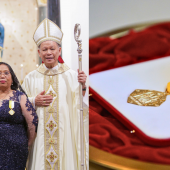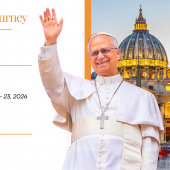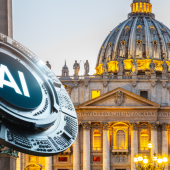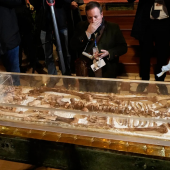Pope Leo XIV charts path of unity and dialogue in first interreligious audience

Just days after his inauguration as Bishop of Rome, Pope Leo XIV met with representatives of other churches, ecclesial communities, and major world religions at the Apostolic Palace, reaffirming his commitment to Christian unity and interreligious dialogue.
The Eucharistic celebration that marked the beginning of his Petrine ministry coincided with the audience.
In his address, Leo expressed heartfelt gratitude to those present, calling their presence and prayers “a tremendous comfort and encouragement.”
He welcomed prominent ecumenical figures, including Ecumenical Patriarch Bartholomew I, Patriarch Theophilos III of Jerusalem, and Catholicos-Patriarch Mar Awa III, reflecting the ongoing pursuit of deeper Christian unity.
The Holy Father also took the opportunity to honor the legacy of Pope Francis, commending his strong emphasis on universal fraternity and mutual understanding.
He specifically referenced the encyclical Fratelli Tutti and the Document on Human Fraternity signed in Abu Dhabi as important milestones in building a culture of encounter.
“May God help us to treasure his witness,” Leo said, pledging to carry forward the mission of dialogue and peace that marked his predecessor’s pontificate.
Leo noted that his election coincides with the 1,700th anniversary of the First Ecumenical Council of Nicaea—a moment he described as a historical foundation for shared Christian faith.
Citing his episcopal motto, In Illo uno unum (“In the One, we are one”), he reaffirmed his dedication to the re-establishment of full and visible communion among Christians.
He emphasized the close connection between synodality and ecumenism and expressed his intention to develop new and practical ways to strengthen dialogue within the Church and among other Christian communities.
Turning to representatives of other religions, the pope reaffirmed the Church’s commitment to interreligious dialogue grounded in mutual respect and the shared desire for peace.
He offered a warm greeting to Jewish and Muslim leaders, recognizing the deep spiritual heritage that connects the Abrahamic faiths. He called for continued theological dialogue and joint efforts to uphold human dignity, peace, and care for creation, especially in times marked by conflict and misunderstanding.
Leo also echoed Pope Francis’ vision of interreligious collaboration as expressed in the Abu Dhabi declaration, emphasizing “dialogue as the path, mutual collaboration as the code of conduct, and reciprocal understanding as the standard.”
He praised the role of the Dicastery for Interreligious Dialogue in fostering meaningful encounters rooted in human fraternity.
Addressing the broader global context, the Holy Father called on all faith communities to become united voices for justice, peace, and integral development.
“If we are in agreement and free from ideological or political conditioning, we can be effective in saying ‘no’ to war and ‘yes’ to peace,” he said, adding that the witness of religious fraternity has the power to build a more hopeful and peaceful world.
Concluding the gathering, Pope Leo XIV invited everyone to seek God’s blessing.
“May his infinite goodness and wisdom help us to live as his children and as brothers and sisters to each other, so that hope may grow in the world,” he said.
Radio Veritas Asia (RVA), a media platform of the Catholic Church, aims to share Christ. RVA started in 1969 as a continental Catholic radio station to serve Asian countries in their respective local language, thus earning the tag “the Voice of Asian Christianity.” Responding to the emerging context, RVA embraced media platforms to connect with the global Asian audience via its 21 language websites and various social media platforms.












